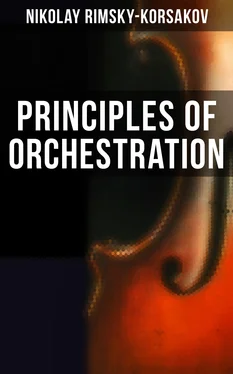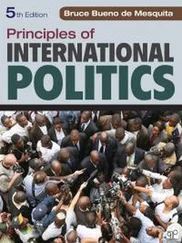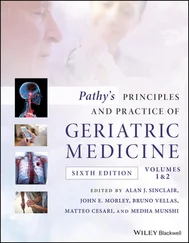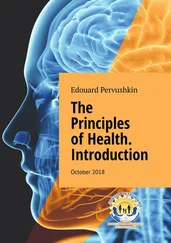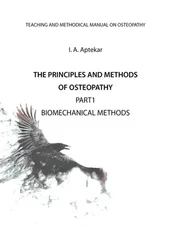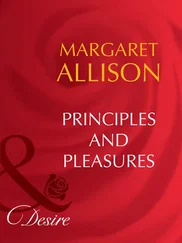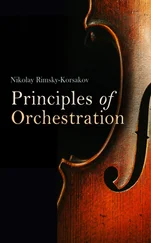Nikolay Rimsky-Korsakov
Principles of Orchestration

Books
OK Publishing, 2020
musaicumbooks@okpublishing.infoTous droits réservés.
EAN 4064066396619
VOLUME I VOLUME I Table of Contents
Chapter I. GENERAL REVIEW OF ORCHESTRAL GROUPS. Chapter I. GENERAL REVIEW OF ORCHESTRAL GROUPS. Table of Contents
Chapter II. MELODY.
Chapter III. HARMONY.
Chapter IV. COMPOSITION OF THE ORCHESTRA.
Chapter V. COMBINATION OF THE HUMAN VOICE WITH ORCHESTRA. THE STAGE BAND.
Chapter VI (Supplementary).
VOLUME II
Extract from the Author’s Preface (1891).
Table of Contents Table of Contents VOLUME I VOLUME I Table of Contents Chapter I. GENERAL REVIEW OF ORCHESTRAL GROUPS. Chapter I. GENERAL REVIEW OF ORCHESTRAL GROUPS. Table of Contents Chapter II. MELODY. Chapter III. HARMONY. Chapter IV. COMPOSITION OF THE ORCHESTRA. Chapter V. COMBINATION OF THE HUMAN VOICE WITH ORCHESTRA. THE STAGE BAND. Chapter VI (Supplementary). VOLUME II
Our epoch, the post-Wagnerian age, is the age of brilliance and imaginative quality in orchestral tone colouring. Berlioz, Glinka, Liszt, Wagner, modern French composers—Delibes, Bizet and others; those of the new Russian school—Borodin, Balakirev, Glazounov and Tschaikovsky—have brought this side of musical art to its zenith; they have eclipsed, as colourists, their predecessors, Weber, Meyerbeer and Mendelssohn, to whose genius, nevertheless, they are indebted for their own progress. In writing this book my chief aim has been to provide the well-informed reader with the fundamental principles of modern orchestration from the standpoint of brilliance and imagination, and I have devoted considerable space to the study of tonal resonance and orchestral combination.
I have tried to show the student how to obtain a certain quality of tone, how to acquire uniformity of structure and requisite power. I have specified the character of certain melodic figures and designs peculiar to each instrument or orchestral group, and reduced these questions briefly and clearly to general principles; in short I have endeavoured to furnish the pupil with matter and material as carefully and minutely studied as possible. Nevertheless I do not claim to instruct him as to how such information should be put to artistic use, nor to establish my examples in their rightful place in the poetic language of music. For, just as a handbook of harmony, counterpoint, or form presents the student with harmonic or polyphonic matter, principles of construction, formal arrangement, and sound technical methods, but will never endow him with the talent for composition, so a treatise on orchestration can demonstrate how to produce a well-sounding chord of certain tone-quality, uniformly distributed, how to detach a melody from its harmonic setting, correct progression of parts, and solve all such problems, but will never be able to teach the art of poetic orchestration. To orchestrate is to create, and this is something which cannot be taught.
It is a great mistake to say: this composer scores well, or, that composition is well orchestrated, for orchestration is part of the very soul of the work . A work is thought out in terms of the orchestra, certain tone-colours being inseparable from it in the mind of its creator and native to it from the hour of its birth. Could the essence of Wagner's music be divorced from its orchestration? One might as well say that a picture is well drawn in colours.
More than one classical and modern composer has lacked the capacity to orchestrate with imagination and power; the secret of colour has remained outside the range of his creative faculty. Does it follow that these composers do not know how to orchestrate? Many among them have had greater knowledge of the subject than the mere colourist. Was Brahms ignorant of orchestration? And yet, nowhere in his works do we find evidence of brilliant tone or picturesque fancy. The truth is that his thoughts did not turn towards colour; his mind did not exact it.
The power of subtle orchestration is a secret impossible to transmit, and the composer who possesses this secret should value it highly, and never debase it to the level of a mere collection of formulæ learned by heart.
Here I may mention the case of works scored by others from the composer's rough directions. He who undertakes such work should enter as deeply as he may into the spirit of the composer, try to realise his intentions, and develop them in all their essential features.
Though one's own personality be subordinate to that of another, such orchestration is nevertheless creative work. But on the other hand, to score a composition never intended for the orchestra, is an undesirable practice. Many musicians have made this mistake and persist in it. [4]
In any case this is the lowest form of instrumentation, akin to colour photography, though of course the process may be well or badly done.
As regards orchestration it has been my good fortune to belong to a first-rate school, and I have acquired the most varied experience. In the first place I have had the opportunity of hearing all my works performed by the excellent orchestra of the St. Petersburgh Opera. Secondly, having experienced leanings towards different directions, I have scored for orchestras of different sizes, beginning with simple combinations (my opera The May Night is written for natural horns and trumpets), and ending with the most advanced. In the third place, I conducted the choir of the Military Marine for several years and was therefore able to study wind-instruments. Finally I formed an orchestra of very young pupils, and succeeded in teaching them to play, quite competently, the works of Beethoven, Mendelssohn, Glinka, etc. All this has enabled me to present this work to the public as the result of long experience.
As a starting-point I lay down the following fundamental axioms:
I. In the orchestra there is no such thing as ugly quality of tone.
II. Orchestral writing should be easy to play ; a composer's work stands the best chance when the parts are well written. [5]
III. A work should be written for the size of orchestra that is to perform it , not for some imaginary body, as many composers persist in doing, introducing brass instruments in unusual keys upon which the music is impracticable because it is not played in the key the composer intends.
It is difficult to devise any method of learning orchestration without a master. As a general rule it is best to advance by degrees from the simplest scoring to the most complicated.
The student will probably pass through the following phases: 1. the phase during which he puts his entire faith in percussion instruments, believing that beauty of sound emanates entirely from this branch of the orchestra—this is the earliest stage; 2. the period when he acquires a passion for the harp, using it in every possible chord; 3. the stage during which he adores the wood-wind and horns, using stopped notes in conjunction with strings, muted or pizzicato ; 4. the more advanced period, when he has come to recognise that the string group is the richest and most expressive of all. When the student works alone he must try to avoid the pitfalls of the first three phases. The best plan is to study full-scores, and listen to an orchestra, score in hand. But it is difficult to decide what music should be studied and heard. Music of all ages, certainly, but, principally, that which is fairly modern. Fairly modern music will teach the student how to score—classical music will prove of negative value to him. Weber, Mendelssohn, Meyerbeer ( The Prophet ), Berlioz, Glinka, Wagner, Liszt, and modern French and Russian composers—these will prove his best guides. It is useless for a Berlioz or a Gevaert to quote examples from the works of Gluck. The musical idiom is too old-fashioned and strange to modern ears; such examples are of no further use today. The same may be said of Mozart and of Haydn (the father of modern orchestration).
Читать дальше
